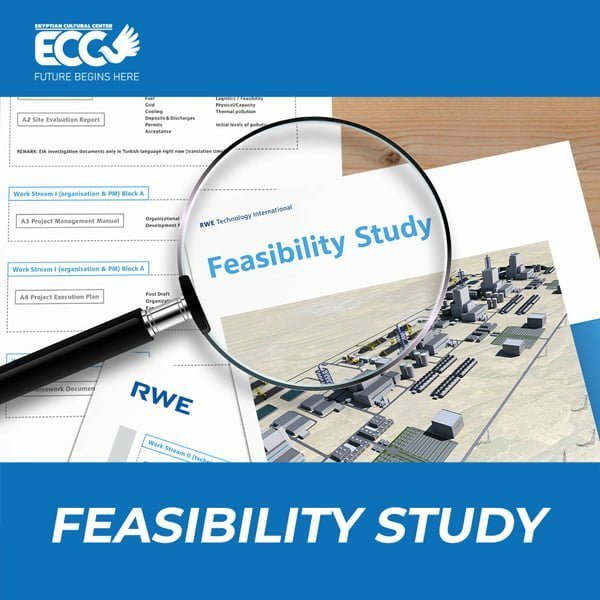We always talk with our friends about various ideas for many projects to implement, but is it going like this !!
Project ideas come to our minds a lot, but whatever this idea is, you need to know how it works and how to make it successful even if you can implement it, you need to evaluate it well first to predict the probability of success or failure. Such a study in the business world is called “Feasibility Study” and we will get acquainted with it in detail in this article.
What is the feasibility study?
The feasibility study is an integrated series of specialized and interrelated studies that are conducted to determine the economic feasibility of projects and verify that the results of the project will exceed the resources that will be allocated to it, as well as reduce the risks that may be exposed to it, and therefore the feasibility study aims to collect information and data on the proposed project to evaluate its success or failure compared to the requirements of the local market, which enables the investor or the owner of the idea to decide to establish the project or not
The importance of feasibility study
- The feasibility study provides scientific and practical evidence on the feasibility of the proposed project or not, by predicting the technical, economic, and marketing changes that may affect the project, as it guides the investor according to the results and information found during the different stages of the project implementation and therefore can be referred to at the various stages of implementation
- It contributes to supporting the vision of the future business as it represents an essential part of determining its scope by assessing the environment surrounding the organization, including where customers will come from and who the competitors are, thus the probability of success can be measured realistically.
- it Helps in risk assessment when making future borrowing decisions and the degree of assurance that it can be repaid on its due date
- It contributes to the know the importance of that project for the country, its ability to compete with other projects in the market, its consistency with development plans, and its potential to contribute to solving some of the problems facing this country. It is also a prerequisite for obtaining the approval of state bodies for the creation of projects
Stages of the project feasibility study
First: the initial analysis of the project
A preliminary analysis is an exploratory study that allows making a decision either to move to a more detailed study or to abandon the project altogether, as it expresses the general outlines of all aspects of the proposed investment project about which data are collected and analyzed such as:-
- The market description is an estimate of the trend of demand for the project’s products, prevailing prices, and consumer tastes.
- Determine the general features of the investment environment, by collecting information about the industry’s economic conditions, its past trends, and the nature of the risks it faces.
- Estimating the operating volume and the availability of the primary production factors for the establishment of the project, including a study of the required raw materials and the availability of technical and administrative competencies for the management and operation of the project.
- Estimate the investment volume and determine the financial resources available to cover the expenses and costs of the project with an estimate of the expected net profit from it.
- Understand and evaluate the fundamental obstacles that Hinder the implementation of the investment idea, whether legal or illegal.
Second: the detailed feasibility study
This stage begins after the appearance of positive results of the initial analysis of the project, where the transition is made to a more detailed study of all aspects of the project, based on which the project is implemented or not
- Marketing study: the detailed feasibility study begins with a marketing study of the project by collecting, recording, and analyzing data on current and future demand and supply, studying competitors and price levels, predicting future developments, identifying consumer tastes and desires, and drawing up a marketing strategy that includes the best ways to promote, distribute and pricing.
- Technical study: at this stage, the production capacities of the project are planned and prepared based on the results and estimates of the marketing study, determining the size of the project and therefore the appropriate production volume for it, identifying the needs of production processes of resources, labor and production requirements, and finally providing data and estimating investment costs and annual operation costs.
- Legal study: at that stage, the project proposal is compared with the laws and regulations governing investment in the country.
- Financial study: the results of previous studies are converted into financial estimates, this study includes investment costs, and annual revenues over the expected useful life of the project while determining how the project will be financed, and finally the results of this study are evaluated using the concept of cash flows.
Third: the evaluation and decision-making stage
After studying the various aspects of the project, the stage of evaluating the results comes to making a decision, where many indicators appear that help in estimating the project’s ability to provide an appropriate return on investment, whether in terms of commercial profitability or national profitability, i.e. the project’s goals must be consistent with the goals of the national economy, and based on those indicators of the profits, cash flow and compatibility with national goals, the final decision is made about the implementation or non-implementation of the project.
The decision to invest in a project isn’t easy, and although the feasibility study of projects takes a long time, it contributes to making the investment decision in a disciplined manner based on scientific studies and statistics that protect against the waste of resources and wasted efforts on projects where the rates of return on investment are low,Therefore, if you want to start your own business, you should do a feasibility study for it so that you can get the highest return on investment and estimate the risks that you may face.


